by Gary Lord
Home - Genesis - 2007 - 2008 - 2009 - Early 2010 - Mid 2010 - Late 2010 - End 2010 - Early 2011 - Mid 2011 - Late 2011 - End 2011 - Early 2012 - Late 2012 - Early 2013- Late 2013 - 2014 - 2015 - Early 2016 - Late 2016 - 2017-19
Chapter Sixteen: Late 2013
Edward Snowden
“I could watch drones in real time as they surveilled the people they might kill. You could watch entire villages and see what everyone was doing. I watched NSA tracking people’s Internet activities as they typed. I became aware of just how invasive US surveillance capabilities had become. I realized the true breadth of this system. And almost nobody knew it was happening.”
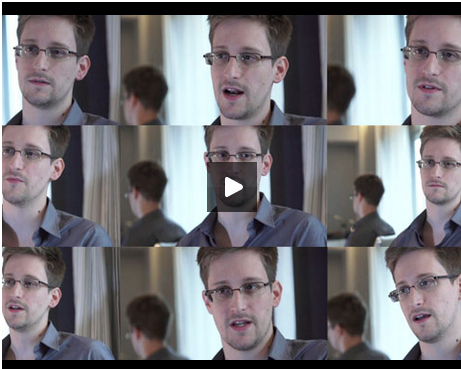
On 9 June 2013 the face of Edward Snowden appeared on TV screens and newspapers around the world. His 12 minute interview with Guardian journalists Glenn Greenwald and Ewen MacAskill, filmed by Laura Poitras, had been recorded over several days in a Hong Kong hotel room. He spoke carefully, but with evident confidence and conviction.
"Uh, my name is Ed Snowden. I’m, uh, 29 years old. I work for Booz Allen Hamilton as an Infrastructure Analyst for NSA, uh, in Hawaii."
In the previous four days, Greenwald, MacAskill and the Washington Post’s Barton Gellman had shocked the world with explosive revelations about the US intelligence community’s extraordinary powers of surveillance. Systems already exposed included PRISM, which gave the NSA direct access to data held by Google, Facebook, Apple and other US internet giants, plus the Boundless Informant program, a big data analysis and visualization tool which let the NSA record and analyse where information was coming from. President Obama had quickly defended the intrusive NSA programs, claiming "the right balance" had been struck between security and privacy. He said US citizens had to make a choice:
"You can’t have 100% security, and also then have 100% privacy and zero inconvenience."
Now Snowden was coming forward as the source of these stories, explaining that his conscience would not let him continue working for the NSA while their powers grew exponentially year by year, without any public scrutiny. Like Chelsea Manning, he said his aim was to reveal the truth and trigger a public debate about "the world we want to live in".
"Any analyst at any time can target anyone, any selector, anywhere," he explained. "Not all analysts have the ability to target everything. But I, sitting at my desk, certainly had the authorities to wiretap anyone, from you, or your accountant, to a federal judge, to even the President, if I had a personal email."
Snowden said he was prepared for whatever might happen to him, noting that the CIA had "an office just up the road here in Hong Kong", but "I have no intention of hiding who I am because I know I have done nothing wrong". He said he was revealing himself so that the media’s attention would be on the documents he revealed, rather than the search for an unknown whistle-blower. But of course the world’s media - not to mention intelligence agents - were now desperate to get hold of him ASAP.
*
The next day, Snowden said goodbye to Poitras and the Guardian journalists, knowing that any further contact with them could reveal his location and jeapordize his life.
“I was being tailed,” Poitras told Vogue magazine. “The risks became very great.”
Snowden checked out of his hotel and moved into Hong Kong’s crowded tenements, where - with a little help from a Canadian human rights lawyer - he was sheltered by a group of asylum seekers.
The Hong Kong government quickly made it clear they did not want to damage relations with the USA by allowing Snowden to stay. This is where WikiLeaks stepped in.
Sarah Harrison was "on WikiLeaks business" in Melbourne, Australia - presumably helping with the WikiLeaks Party - when Julian Assange asked her to urgently fly to Hong Kong, a city she knew well because her two sisters lived there. Harrison quickly packed her bags, leaving half her luggage behind as she expected to return soon.
For the next thirteen days, Harrison and Assange tried to obtain diplomatic protection for Snowden, meeting with lawyers in Hong Kong and working trusted connections within the Ecuadorian government. WikiLeaks booked more than a dozen different flights for Harrison and Snowden.
“We also got Snowden to buy a ticket to India on his own credit card,” Harrison says. “We were working very hard to lay as many false trails as possible. I just kept hoping the tickets would be OK’d”.
Harrison didn’t actually meet Snowden until the morning of Sunday 24 June, when he climbed into a car with her and headed to the airport. They both dressed casually, hoping to look like a young couple on vacation, and barely spoke until their Aeroflot flight to Moscow was in the air. Then Snowden turned to Harrison and smiled:
“I didn’t expect that WikiLeaks was going to send a ninja to get me out.”
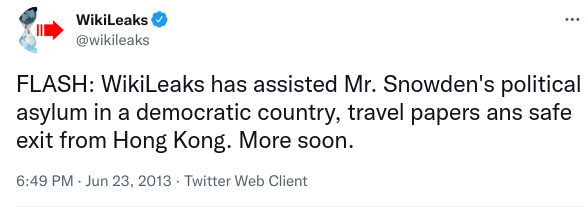
The USA had hurriedly filed multiple charges against Snowden and were demanding his immediate arrest. But Hong Kong officials said the US documents seeking his detention did not "fully comply" with their legal requirements. After confirming that Snowden had left the country, they explained that US officials wrote Snowden’s middle name as "James" instead of "Joseph". Then they angrily demanded that US officials clarify Snowden’s recent claims that the NSA was spying on Hong Kong and mainland China.
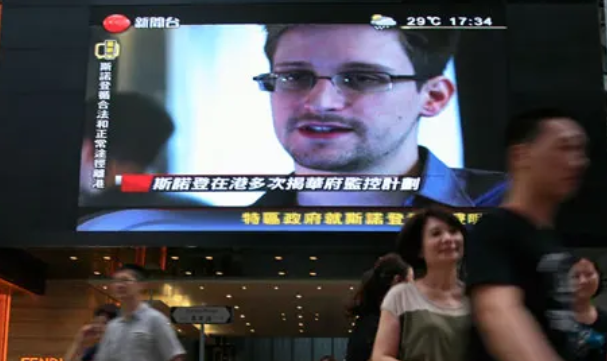
The WikiLeaks "ninja" still had a lot of work to do. Arriving safely in transit at Moscow’s Sheremetyevo airport on 23 June 2013, Snowden and Harrison tried to check-in for their onward flight to Latin America, only to discover that Snowden’s passport had been cancelled.
By now journalists were swarming all over the airport. Media were reporting that Snowden would be flying to Havana, Cuba. At least one journalist booked a seat on Snowden’s expected flight, only to find it empty. Snowden - and Harrison - had disappeared.
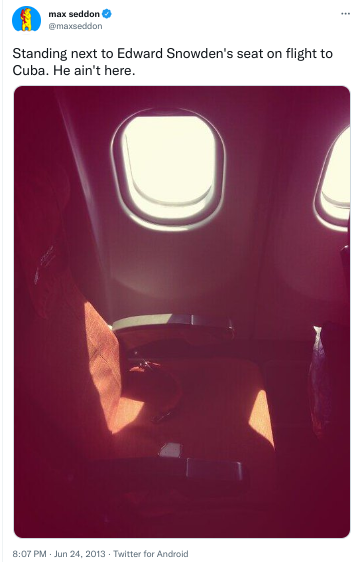
The next day, both US President Obama and US Secretary of State John Kerry urged Russia to hand over the "fugitive from justice". But Russia’s foreign minister insisted that Snowden had never even crossed the border into Russia. This was technically true: Harrison and Snowden, who did not have a Russian visa, were trapped in the airport’s "In Transit" zone.
Russian President Vladimir Putin eventually admitted that Snowden was at Sheremetyevo airport but he said the NSA whistle-blower was free to leave Russia at any time and would not be extradited to the USA.
Obama immediately toned down his rhetoric, telling a press conference in Senegal that he didn’t want to be “wheeling and dealing and trading” just to “get a guy extradited.”
"I’m not going to be scrambling jets to get a 29-year-old hacker," the US President said.
Snowden, of course, was not a criminal hacker, and he had celebrated his 30th birthday just before leaving Hong Kong. In a statement marking his first year in the embassy, Julian Assange said President Obama was far more deserving of the label "traitor" than Snowden ever would be:
"Who was it who promised a generation "hope" and "change", only to betray those promises with dismal misery and stagnation? Who took an oath to defend the US constitution, only to feed the invisible beast of secret law devouring it alive from the inside out?
"Who is it that promised to preside over The Most Transparent Administration in history, only to crush whistleblower after whistleblower with the boot heel of espionage charges?
"Who combined in his executive the powers of judge, jury and executioner, and claimed the jurisdiction of the entire earth on which to exercise those powers? Who arrogates the power to spy on the entire earth - every single one of us - and when he is caught red handed, explains to us that "we’re going to have to make a choice".
Assange praised Snowden’s courage, saying "the mark of international distinction and service to humanity is no longer the Nobel Peace Prize, but an espionage indictment from the US Department of Justice".
Meanwhile the USA was putting immense pressure on countries around the world.
Ecuador initially appeared ready to give Snowden asylum, especially after discovering a bugging device in their London embassy. But President Correa back-tracked after Spanish media leaked documents including a safe conduct pass for Snowden, dated 22 June 2013, which bore the name (but not the signature) of Ecuador’s London consul, Fidel Narvaez, who was a strong supporter of Assange. Ecuador’s ambassador to the USA told a colleague that someone should talk to Assange, because "from outside, he appears to be running the show." This was embarrassing for President Correa, who had already cancelled a key US trade pact and slyly offered the USA a $23m donation for human rights training.
Correa said US Vice President Joe Biden had personally and very politely asked him not to give asylum to Snowden, but Ecuador would not make such a decision unless Snowden turned up on their soil:
"The moment that he arrives, if he arrives, the first thing is we’ll ask the opinion of the United States, as we did in the Assange case with England," Correa said. "But the decision is ours to make."
*
On 1 July 2013 Edward Snowden published a statement on the WikiLeaks website.
"One week ago I left Hong Kong after it became clear that my freedom and safety were under threat for revealing the truth. My continued liberty has been owed to the efforts of friends new and old, family, and others who I have never met and probably never will. I trusted them with my life and they returned that trust with a faith in me for which I will always be thankful."
Snowden condemned Obama for promising no "wheeling and dealing" but then asking Joe Biden and others to exert pressure on states where asylum was being requested.
The Obama administration has now adopted the strategy of using citizenship as a weapon. Although I am convicted of nothing, it has unilaterally revoked my passport, leaving me a stateless person. Without any judicial order, the administration now seeks to stop me exercising a basic right. A right that belongs to everybody. The right to seek asylum.
In the end the Obama administration is not afraid of whistleblowers like me, Bradley Manning or Thomas Drake. We are stateless, imprisoned, or powerless. No, the Obama administration is afraid of you. It is afraid of an informed, angry public demanding the constitutional government it was promised — and it should be.
A day earlier, Sarah Harrison had personally delivered a number of requests for asylum to an official at the Russian consulate in Sheremetyevo Airport. The countries petitioned included Austria, Bolivia, Brazil, China, Cuba, Finland, France, Germany India, Italy, Ireland, the Netherlands, Nicaragua, Norway, Poland, Russia, Spain, Switzerland and Venezuela. Previous requests had been submitted to Ecuador and Iceland (where the CEO of DataCell had offered to fly Snowden in a private jet).
Vladimir Putin immediately rejected Snowden’s appeal:
"If he wants to go somewhere and someone will take him, go ahead. If he wants to stay here, there is one condition – he must stop his work aimed at bringing harm to our American partners, as strange as that sounds coming from my mouth."
"Considering that he considers himself a human rights activist and a fighter for human rights, he probably doesn’t plan to stop this work, so he should choose a host country and head there. When this will happen I, unfortunately, do not know."
These harsh comments, which lead to Snowden withrawing his Russian asylum application a day later, came despite many Russian MPs calling for Snowden to stay, with some even offering to nominate him for a Nobel peace prize. Putin, a former KGB intelligence officer, also denied that Snowden was a Russian spy, as many critics in the US media were claiming.
"Mr Snowden is not our agent, never was and isn’t today. Our special services have never worked with him and are not working with him."
Snowden later claimed that he had been approached by Russian agents in the airport but turned them away. Sarah Harrison noted that it wasn’t possible to broker a deal on asylum because Snowden had already handed over all his files to Western journalists.
*
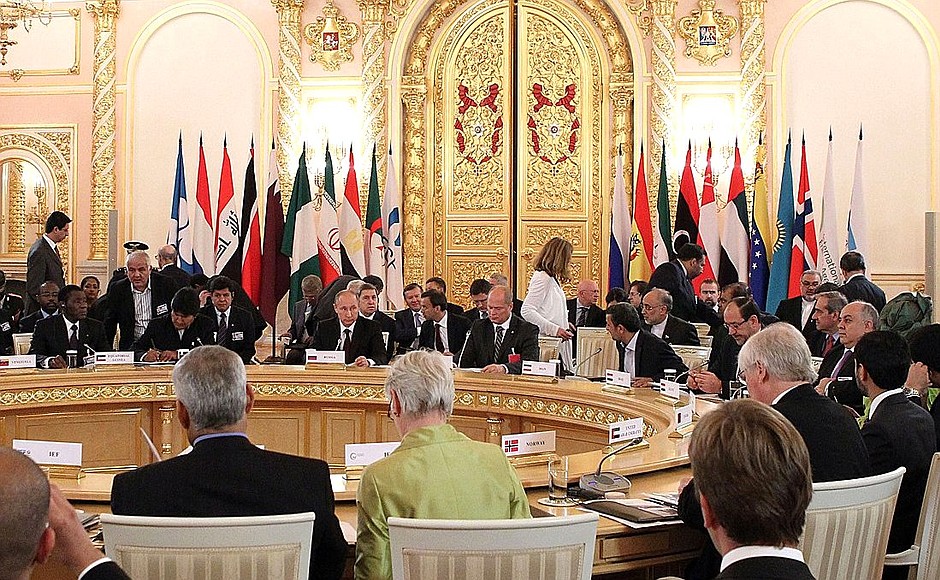
In early July 2013, Moscow hosted a major summit of gas exporting countries, with numerous world leaders in attendance. On the last day of the summit, Bolivian president Evo Morales said his country was keen to "shield the denounced" and would likely consider Snowden’s asylum request favourably. Venezuelan President Nicolas Maduro, also in Moscow, insisted that Snowden should be given a "humanitarian medal".
"This young man of 29 was brave enough to say that we need to protect the world from the American imperial elite, so who should protect him? All of mankind, people all over the world must protect him."
The next day, after flying uninterrupted over Poland and the Czech Republic on the way home to Bolivia, the Presidential airplane of Evo Morales was forced to land unexpectedly in Vienna, the Austrian capital. France, Spain, Portugal and Italy had all suddenly denied access to their airspace. Austrian officials insisted on searching the plane, which remained grounded for 14 hours. Bolivian officials accused the United States of trying to “kidnap” President Morales, just because they thought Edward Snowden was on board the plane (he was not). The White House declined to comment.
“We have no doubt that it was an order from the White House," said Bolivia’s ambassador to the United Nations. "By no means should a diplomatic plane with the president be diverted from its route and forced to land in another country.”
A host of Latin American nations filed complaints with UN Secretary-General Ban Ki-moon, who himself had come under fire for blaming Snowden for leaking the NSA files.
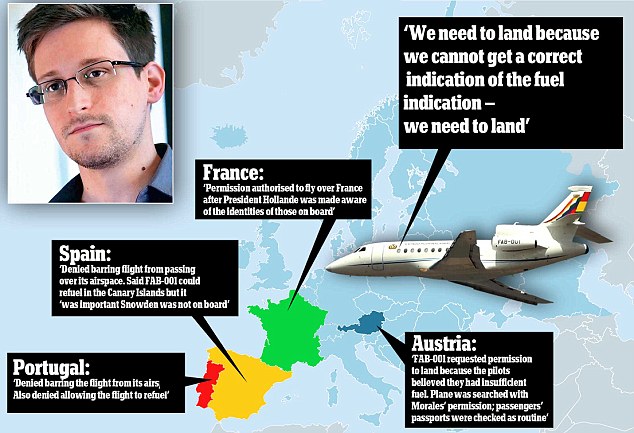
Two years later, Julian Assange revealed that WikiLeaks had inadvertently played a part in the grounding of Morales' plane. He said WikiLeaks staff, while trying to help Snowden get out of Moscow, had "managed to get some intelligence on the US government thinking of the different types of jets and that they were concerned that the presidential jets might be difficult for them, from a legal perspective".
"In fact, from a legal perspective, they are flying embassies. They’re protected under the Vienna Convention. And no one has a right to go into the presidential jet."
Assange said this caused the WikiLeaks team to start thinking about getting Snowden out of Moscow on one of the Presidential jets that were in town for the oil summit. WikiLeaks was using the word "Bolivia" as a codename for the real country where they hoped to send Snowden, even when talking "on open lines to lawyers in the United States".
"We had engaged in a number of these distraction operations in the asylum maneuver from Hong Kong, for example, booking him on flights to India through Beijing and other forms of distraction, like Iceland, for example. We didn’t think this was anything more than just distracting.
"But the U.S. picked up a statement, a supportive statement made in Moscow by President Evo Morales, and appears to have picked up our codeword for the actual operation, and put two and two together and made 22…"
Assange said the downing of Morales' jet revealed "the true nature of the relationship between Western Europe and the United States".
"Just a phone call from U.S. intelligence was enough to close the airspace to a booked presidential flight, which has immunity. And they got it wrong. They spent all that political capital in demanding this urgent favor to close the airspace, which was humiliating to those Western European countries, and they got it wrong."
*
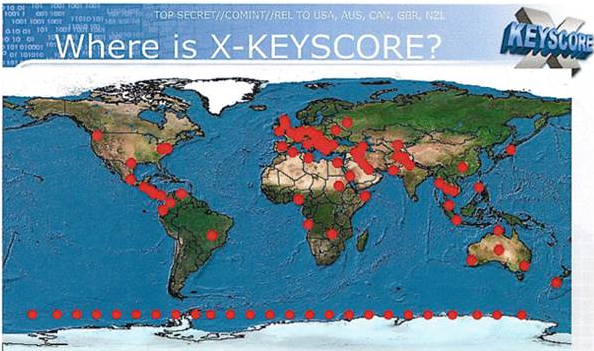
Meanwhile, week after week of major media revelations from Snowden’s files were changing how the world understood government surveillance. Journalists used to ridicule Julian Assange’s protective security measures - like putting a cover over a laptop camera - as "paranoid". But now they learned that Edward Snowden, an experienced NSA professional, had lined the door of his Hong Kong hotel room with pillows and put a large red hood over his head and laptop when entering passwords. It is beyond the scope of this book to examine all Snowden’s revelations, but the whole world was suddenly looking at their emails, phones, laptops - and the US intelligence agencies - in a whole new light.
World leaders were not the only ones coming under pressure from Washington. On 5 July the editors of the Washington Post - whose own journalist Bart Gellman had published front page scoops based on the files given to him by Laura Poitras - wrote a bizarre editorial titled "Plugging the leaks in the Edward Snowden case". After helping expose PRISM and other intrusive NSA surveillance programs, the paper now said it was necessary to prevent Snowden from leaking information that "harms efforts to fight terrorism and conduct legitimate intelligence operations."
- NOTE
-
This was sheer humiliation from a newspaper that had helped break the Watergate scandal, but was now in dire financial straits. A month later, Amazon CEO Jeff Bezos bought the Washington Post for $250 million in "an out-of-the-blue deal". In the same week, the New York Times sold the Boston Globe for $70 million, after buying it for $1.1 billion in 1993. Later, Bezos signed a $600 million deal with the CIA to host all their information on Amazon Cloud servers.
In London, meanwhile, the Guardian had published scoops revealing that GCHQ (Britain’s Government Communications Headquarters) also had access to PRISM, had intercepted foreign politicians' communications at the 2009 G20 summit, could tap into to the global network of Internet cables, and was sharing information with the NSA. The British government then threatened the UK Guardian with legal action, which could have forced them to stop publishing further Snowden revelations or even shut down the newspaper.
"We can do this nicely or we can go to law," said an emissary from the Prime Minister. "A lot of people in government think you should be closed down."
The Guardian backed down and made a deal. On 20 July, GCHQ officers watched on as Guardian editors with angle grinders and electric drills destroyed the hard drives in their London office that had contained the Snowden files. Bizarrely, the Guardian’s US office - and others - still had copies of the files. Two weeks later the Guardian reported that GCHQ had received at least £100m from the US government in exchange for "access to and influence over" Britain’s intelligence gathering programmes.
In January 2014 the head of GCHQ resigned. Iain Lobban had also been called before the Commons committee, the first time a head of GCHQ had given evidence in public. The Foreign Office insisted his resignation had nothing to do with the Snowden revelations.
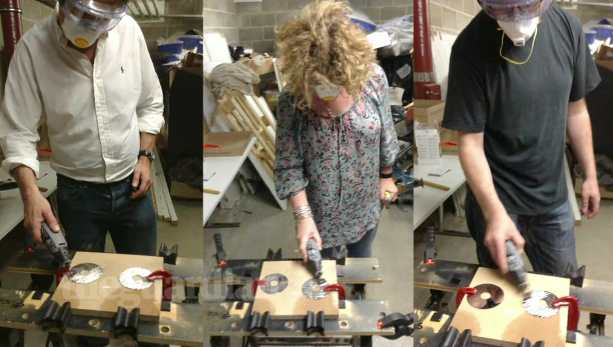
*
Journalists at Moscow airport had by now spent weeks desperately hoping for a glimpse of Snowden.
“I’ve spent up to eighteen hours a day beyond passport control and security looking for Snowden,” complained one ABC News employee after just a week. “There is an irrational fear, even late at night, that the moment I call it quits he’ll come strolling down the hall.”
Sarah Harrison later explained how she and Snowden had managed to hide from the media for 39 days. She said the Moscow airport officials were "very kind", partly because this was "the most exciting thing that had happened to them in a long time."
"The transit area is enclosed but they were able to find us a room, not the most pleasant of rooms - it didn’t have a window or anything - but it did allow us to shut the door and stay in there with very little outgoings."
They did their laundry in a small sink, watched movies on their laptops, and survived on airport food. Harrison managed to occasionally move around the airport with some simple disguises - "For girls, it’s a bit easier to fit in”" - but mostly stayed with Snowden to provide a form of 24/7 protection, knowing WikiLeaks could reach a huge global audience very quickly if needed.
“If anything untoward happened to him, I was there as a witness. We would have made sure that the world knew.”
Assange said he had advised Edward Snowden that he would be safest in Russia, but Snowden "didn’t want to be accused of being some kind of Russian spy… he didn’t want that kind of propaganda attack to distract from the revelations, even though it would place him at some increased risk".
After the downing of the Bolivian President’s plane, however, and even though a handful of angry Latin American governments had stepped forward to offer asylum, "at a legal level, in terms of asylum law, it was very clear that there could not be a fair process". Any attempt by Snowden to leave Russia now would put his life at risk. If he was on a plane, it could be shot down.
"And at a political level," said Assange," the Russian government had to react. And it couldn’t react by handing him over. It would look weak and unprincipled. It only had one other card it could play, which is to accept his asylum."
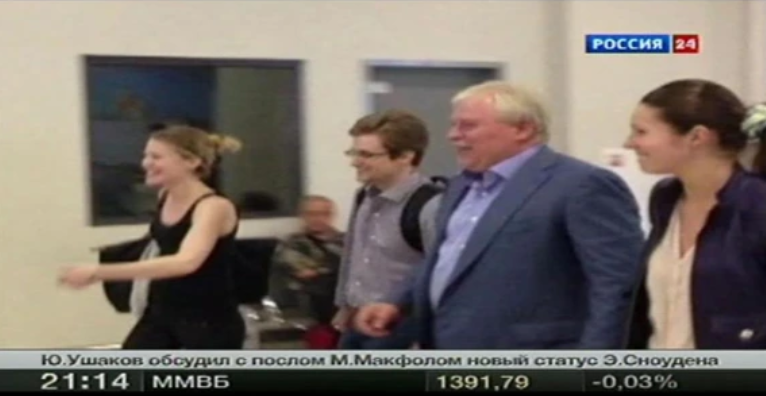
On 1 August 2013, with help from a prominent Russian lawyer, Edward Snowden and Sarah Harrison finally left the transit zone of Moscow’s Sheremetyevo airport and officially entered Russia. WikiLeaks issued a statement explaining that Snowden’s certificate of temporary asylum afforded him "the right to live in and travel around Russia, where he can now plan his next steps in safety".
WikiLeaks noted that President Barack Obama "while elected on a platform promising to protect whistleblowers, has now prosecuted more national security whistleblowers than all other presidents in United States history combined". They also noted US efforts to block asylum were a violation of United Nations General Assembly Resolution 2312 (1967): "the grant of asylum. . . is a peaceful and humanitarian act and… as such, it cannot be regarded as unfriendly by any other State."
In the end, of all the countries in the world, it was only Venezuela, Bolivia and Nicaragua who "stood strong and granted Mr Snowden asylum".
At a meeting with lawyers and human rights organisations on the 12th July, Mr Snowden announced that he accepted Venezuela’s asylum offer, although ultimately US interference has, at least for the time being, prevented its practical acceptance.
Harrison and Snowden left the airport in a taxi and headed to a "secure, confidential place." Sarah Harrison stayed with Ed Snowden for another three months before flying to Berlin at the end of 2013. She said her lawyers had advised her not to return home to Britain, where she could be detained under sweeping new antiterrorism laws. Edward Snowden praised the woman who had helped save him from life in a US supermax prison - or worse.
"Sarah refuses to allow intimidation to shape her decisions," he said. "If you forced her to choose between disowning her principles or being burned at the stake, I think she’d hand you a match’."
*
In early August 2013, in response to mounting public anger, President Obama announced changes to US surveillance programs, which he claimed to have been planning for a long time. He insisted that Edward Snowden did not deserve any credit:
"I don’t think Mr. Snowden was a patriot. As I said in my opening remarks, I called for a thorough review of our surveillance operations before Mr. Snowden made these leaks. My preference – and I think the American people’s preference – would have been for a lawful, orderly examination of these laws; a thoughtful, fact-based debate that would then lead us to a better place, because I never made claims that all the surveillance technologies … somehow didn’t require, potentially, some additional reforms. That’s exactly what I called for."
In response, Bart Gellman said Snowden “has accomplished far more than anyone in his position could have reasonably hoped to have accomplished.”
“He told me that his greatest fear was that he would come out and do this and the whole story would be… roiling around for a day and it would be gone,” Gellman said. “But it’s at the top of the agenda now for two months.”
*
Death of Michael Hastings
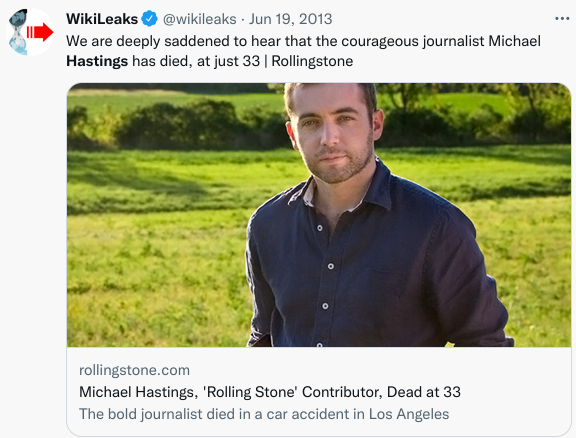
On 19 June 2013 WikiLeaks tweeted that they were deeply saddened to hear of the sudden death of journalist Michael Hastings, who had spent three days with Julian Assange for a front page Rolling Stone interview in early 2012 (see Chapter Thirteen).
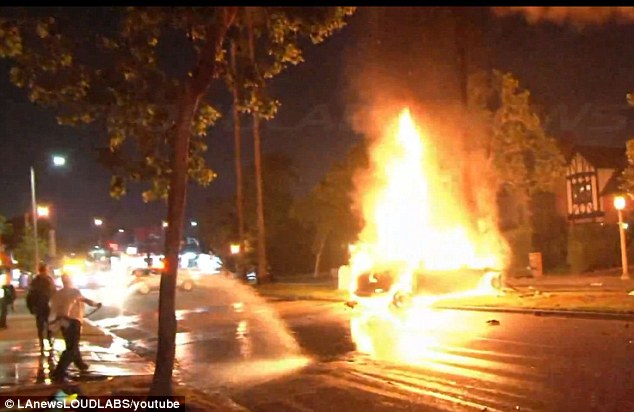
Hastings died in a ball of flames when his C250 Mercedes hit a tree in Los Angeles' Hancock Park neighborhood around 4:30 am on Tuesday 18 June. The ejected motor reportedly came to rest 50 meters away from the burning chassis. Video from a nearby intersection showed the car racing straight through a red light at high speed. A witness claimed she saw flames and sparks coming out from under the car before the crash.
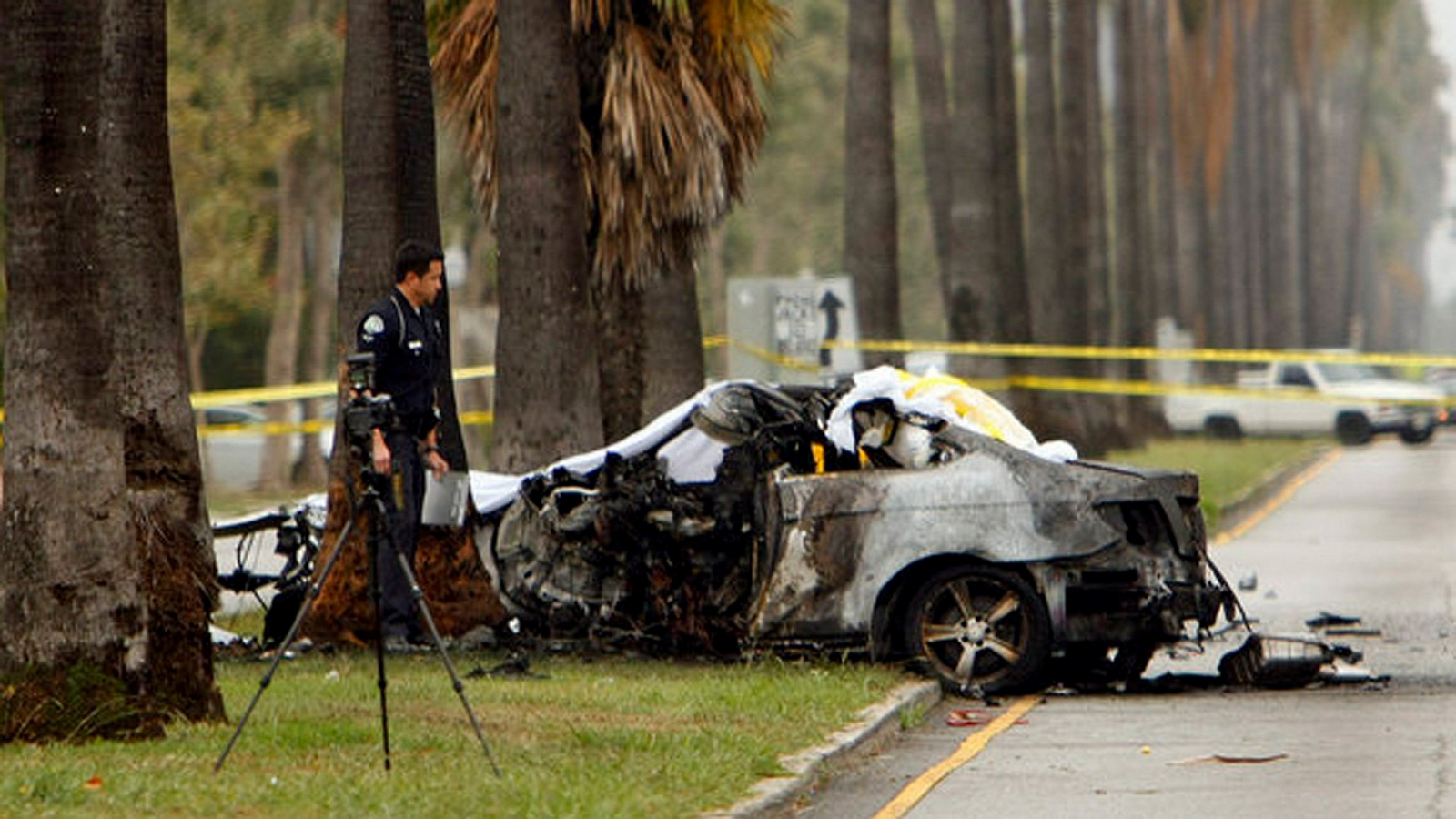
The next day, WikiLeaks revealed that Hastings had been in touch with their lawyer Jennifer Robinson and he believed the FBI was investigating him.
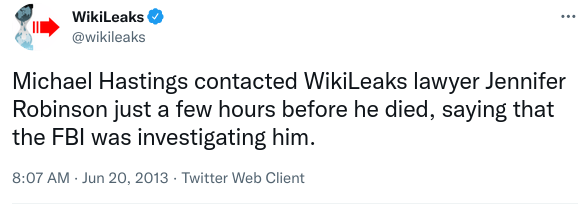
In an usual step, swamped with angry phone calls, the FBI publicly denied they were investigating Hastings.
“At no time was journalist Michael Hastings under investigation by the FBI,” agency spokeswoman Laura Eimiller said.
In response to an FOI request, however, the FBI soon admitted that they had collected information on Hastings:
"Whether or not his name surfaced during another investigation, or his name is in our files for some reason, that’s another question."
Public suspicion over the tragic death was not unjustified, particularly as the Snowden revelations were still front page news. Hastings' last article for Buzzfeed had explored Obama’s "war on journalism", including recent efforts to subpoena the phone records of twenty Associated Press (AP) reporters. In a Young Turks interview, Hastings angrily stated that President Obama had declared war on the press and journalists should respond by saying "we declare war on you". He said journalists "have been way too easy going with these guys" and should refuse to keep co-operating with government officials.
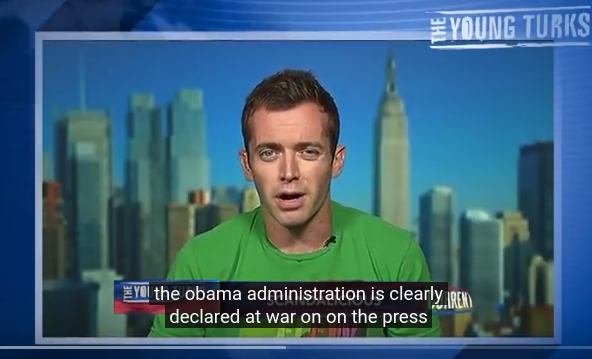
It was soon revealed that Hastings had also sent an email to his Buzzfeed colleagues the day before he died, warning that federal authorities were interviewing his friends and he needed to go "off the rada[r]" for a bit.
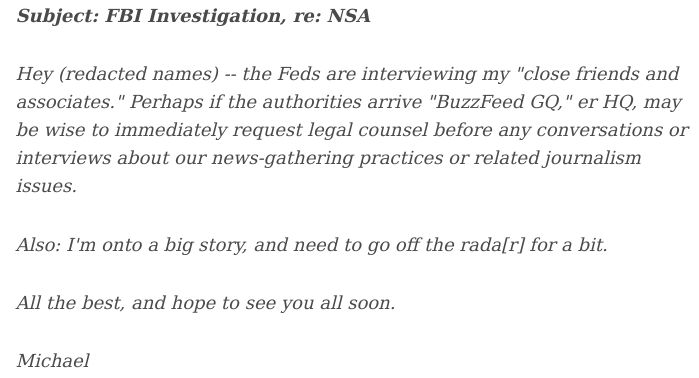
A neighbor told the Los Angeles Weekly that Hastings had been scared to get into his own car just hours before he died, and had begged her to let him borrow her Volvo. She turned him down, saying her car had mechanical problems.
Online forums began speculating that the US intelligence services may have murdered Hastings by hacking into his car’s onboard computer and forcing it to drive at full throttle till he crashed. In 2017 the WikiLeaks Vault7 release confirmed that such dangerous CIA software tools did indeed exist.
Nevertheless, Michael Hastings' family were quick to hose down such "conspiracy theories". They revealed that Hastings had suffered a "manic episode" fifteen years earlier, where drugs and alcohol were involved, and they believed he was experiencing a similar episode when he died. In a Rolling Stone interview on 5 November 2013, Hastings' elder brother Jonathan explained that he had flown down from New York a day before Michael died, hoping to get him into a rehab clinic.
"I’d thought that I had at least convinced Mike to just stay in his apartment and chill out for the next few days, but he snuck out on me when I was sleeping. He crashed his car before anyone could do anything to help him."
Jonathan Hastings said his family had "no real complaints" about the LA police or the coroner’s report, which "didn’t tell us anything we didn’t already know or strongly suspect." The report said Michael Hastings had been been proscribed "medical marijuana" to help deal with PTSD since his war reporting years; after using marijuana the night before he died, he had "passed out" around 1 am, at which stage his brother had gone to stay with a neighbour. The report said Michael Hastings was also "believed" to be using the hallucinogenic drug DMT:
"Toxicology shows a small amount of amphetamine in the blood, consistent with possible intake of methamphetamine many hours before death, unlikely to have produced an intoxicative effect at the time of the accident. Marijuana was present in the blood, but mostly in the form of its metabolite, indicating intake hours earlier. All other drugs were negative".
Nevertheless, Jonathan Hastings said he ruled out foul play "entirely".
"I might have been suspicious if I hadn’t been with him the day before he died. After all, he definitely was investigating and writing about a lot of sensitive subjects. But based on being with him and talking to people who were worried about him in the weeks leading up to his death, and being around him when he had had similar problems when he was younger, I was pretty much convinced that he wasn’t in danger from any outside agency."
*
Global Trade Agreements
The Trans-Pacific Partnership (TPP) was a proposed global trade agreement that enshrined many deeply unpopular aspects of globalisation, including threats to environmental regulations, developing countries, and internet freedom. The TPP was a major part of a huge raft of global trade deals including the Transatlantic Trade and Investment Partnership (TTIP) and the Trade in Service Agreement (TiSA).
In late 2012, when massive global protests appeared incapable of stopping the secretive deals, Just Foreign Policy proposed a novel approach:
"Just Foreign Policy is issuing a reward if WikiLeaks publishes the TPP negotiating text. Instead of getting one rich person to put up the money, we’re "crowdsourcing" the reward. "
Just Foreign Policy said it was a great way for people to show support for WikiLeaks while also expressing public opposition to the TPP. By late 2013, supporters had pledged around $75,000.

WikiLeaks never managed to publish the full contents of the TPP, but on 13 November 2013 - just days before a decisive TPP Chief Negotiators Summit in Salt Lake City - WikiLeaks released the current draft text of the highly controversial Intellectual Property Rights Chapter, which had critical implications for global Internet freedom. The draft chapter showed that Australia and the USA were isolated in negotiations:
"Australia, an important US ally, lined up with the US 64 times, considerably more than the next highest, Peru (54), Singapore (51).
"Throughout the text it is clear that on the contentious issues, Australia’s position is closely aligned with the US. Australia and the US are the only two countries to object to a proposal to limit Internet service providers' liability in relation to copyright infringement, a proposal supported by the remaining countries (minus Japan which does not express its position)."
Analysis by EFF said the leaked text confirmed "long-standing suspicions about the harm the agreement could do to users’ rights and a free and open Internet".
"From locking in excessive copyright term limits to further entrenching failed policies that give legal teeth to Digital Rights Management (DRM) tools, the TPP text we’ve seen today reflects a terrible but unsurprising truth: an agreement negotiated in near-total secrecy, including corporations but excluding the public, comes out as an anti-user wish list of industry-friendly policies."

On 15 January 2014, WikiLeaks released the secret draft text of the TPP’s Environment Chapter and the corresponding Chairs' Report. Julian Assange said the environmental chapter was clearly just "a toothless public relations exercise with no enforcement mechanism."
"When compared against other TPP chapters, the Environment Chapter is noteworthy for its absence of mandated clauses or meaningful enforcement measures. The dispute settlement mechanisms it creates are cooperative instead of binding; there are no required penalties and no proposed criminal sanctions. With the exception of fisheries, trade in 'environmental' goods and the disputed inclusion of other multilateral agreements, the Chapter appears to function as a public relations exercise."
On 16 June 2014 WikiLeaks released the Financial Services Annex of the secret Trade in Services Agreement (TISA), which covered 50 countries and nearly 70% of world trade in services. The draft had been classified to keep it secret not just during negotiations but for five years after it entered into force.
"Despite the failures in financial regulation evident during the 2007-2008 Global Financial Crisis and calls for improvement of relevant regulatory structures2, proponents of TISA aim to further deregulate global financial services markets. The draft Financial Services Annex sets rules which would assist the expansion of financial multi-nationals – mainly headquartered in New York, London, Paris and Frankfurt – into other nations by preventing regulatory barriers. The leaked draft also shows that the US is particularly keen on boosting cross-border data flow, which would allow uninhibited exchange of personal and financial data."
On 16 October 2014, just days before "decisive" TPP meetings in Canberra and Sydney, WikiLeaks released an updated version of the TPP Intellectual Property Rights chapter. The update showed little change to controversial and damaging areas like digital rights, but also "significant industry-favouring additions within the areas of pharmaceuticals and patents". Bracketed sections showed there was still huge internal disagreement and negotiations on key areas appeared to have stalled. Julian Assange said the TPP was clearly "too damaging to be brought into force" and "should stop now".
Further public protests were again brushed away as negotiations continued until early 2016, when the TPP trade agreement was formally signed by leaders from Australia, Brunei, Canada, Chile, Japan, Malaysia, Mexico, New Zealand, Peru, Singapore, Vietnam, and the United States. Months later, however, newly elected US president Donald Trump withdrew the USA from the deal, fulfilling an election promise. This meant the TPP could not be ratified and did not enter into force. The remaining countries signed a new trade agreement, the Comprehensive and Progressive Agreement for Trans-Pacific Partnership, on 30 December 2018.
*
UK Press Pressure
On 28 November 2013 London Mayor Boris Johnson delivered a lecture in honour of Margaret Thatcher, where he repeated the 1980’s Wall Street mantra that "greed is good". In his closing statements, the future Prime Minister stated, to laughter and loud applause:
“By 2050… some things will still be the same… Julian Assange will still be holed up in the Ecuadorian Embassy, wasting police time & resources, but one thing will have changed forever, and that is the myth of British decline.”
On the same day, British Prime Minister David Cameron warned journalists that "if they don’t demonstrate some social responsibility it will be very difficult for government to stand back and not to act".
“I don’t want to have to use injunctions or D-notices or the other tougher measures. I think it’s much better to appeal to newspapers’ sense of social responsibility."
Days later, the editor-in-chief of the Guardian, Alan Rusbridger, appeared before the Home Affairs Select Committee, where he was forced to defend the publishing of Snowden stories, which MPs labelled “woefully irresponsible”.
Rusbridger revealed that in every case bar one he had consulted the DA Notice pre-publication censorship committee before publishing. Nevertheless, he was accused of "putting lives at risk" by sending unredacted Snowden documents overseas to the New York Times. Rusbridger responded that he had told the UK Cabinet Secretary he was doing this in July and the government had not complained. Cressida Dick, the Assistant Commissioner of the Metropolitan Police, insisted that the the alleged communication of agents’ names abroad was a potential breach of section 58(a) of the Terrorism Act.
In August 2013, David Miranda, the partner of journalist Glenn Greenwald, had been detained for nine hours at London’s Heathrow Airport and questioned under anti-terrorism laws. Miranda was en route from Berlin to his home in Rio De Janeiro, carrying encrypted material from the Snowden files, which was seized. Greenwald had angrily responded that he would "write much more aggressively than before.” He resigned from the Guardian two months later to help set up a new, supposedly more aggressive, news organisation called "The Intercept". Now Cressida Dick told the Commons comittee that police still had not been able to decrypt the files taken from Miranda, but the investigation might yet result in charges.
Labour MP Keith Vaz, who was born in Yemen, asked Rusbridger: "Do you love this country?" Somewhat taken aback, the Guardian EIC insisted that he and his staff were "patriots".
Asked by Conservative MP Michael Ellis whether he had broken the Terrorism Act, Rusbridger replied that he was not a lawyer so could not answer the question. He said the paper had "made very selective judgments"' about what to publish:
"We have published I think 26 documents so far out of the 58,000 we’ve seen… There is stuff in there about Iraq and Afghanistan – we’re not even going to look at it".
This might have been what saved the Guardian from further government attacks. To WikiLeaks, of course, such an admission was like a red rag to a bull.

Edward Snowden later explained that he never intended for his entire archive to be published; he left it at the discretion of Glenn Greenwald and other trusted journalists to decide what to publish. WikiLeaks tweeted that the limited release to date was "a result of pressure, self-censorship, control issues".

*
30c3
In the final week of 2013, the 30th Chaos Computer Club Congress was held in Berlin.
"This year we found ourselves waking up from a bad dream, to a reality that was even worse," said Tim Pritlove, one of the organizers. “We have woken to a reality that can no longer be ignored.”
Glenn Greenwald delivered a one hour speech via satellite on the opening night, praising Snowden’s courage and warning that the surveillance state "by its very existence, breeds conformity".
Two days later Jacob Applebaum took the stage and introduced a "surpise guest". Sarah Harrison received a rapturous standing ovation from thousand of attendees. She humbly noted that WikiLeaks editor Julian Assange was now spending his fourth Christmas detained without charge.
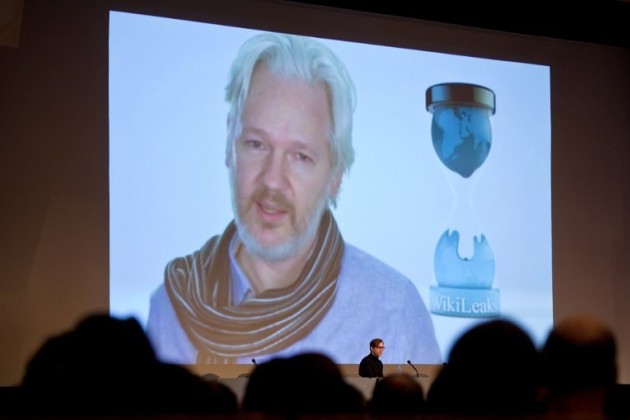
Assange joined the stage via Skype and was knocked offline a minute later. He rejoined the discussion to encourage system administrators and other "high-tech workers" to organize against national surveillance programs. He said the NSA and CIA were now keen to recruit from this new generation of skilled online workers, who should consider joining such organisations: "go in there, get the ball and bring it out."
"This is the last free generation," warned Assange. "The coming together of the systems of governments, the new information apartheid across the world, the linking together, is such that none of us will be able to escape it in just a decade. Our identities will be coupled to it, the information sharing such that none of us will be able to escape it. We are all becoming part of the state, whether we like it or not, so our only hope is to determine what sort of state it is that we are going to become part of."
Assange said that if people did not recognise what was happening and speak up then "we are the group that will be crushed." Then he was knocked off line again.
- NOTE
-
US agents had spied on Assange and others connected to WikiLeaks at the Chaos Computer Club Congress back in 2009. In September 2013 Assange filed charges in Germany after an ex-Marine gave witness testimony at the Manning trial. Assange’s affidavit detailed evidence of years of hostile US surveillance, including while he was in Sweden and the 2009 episode in Germany:
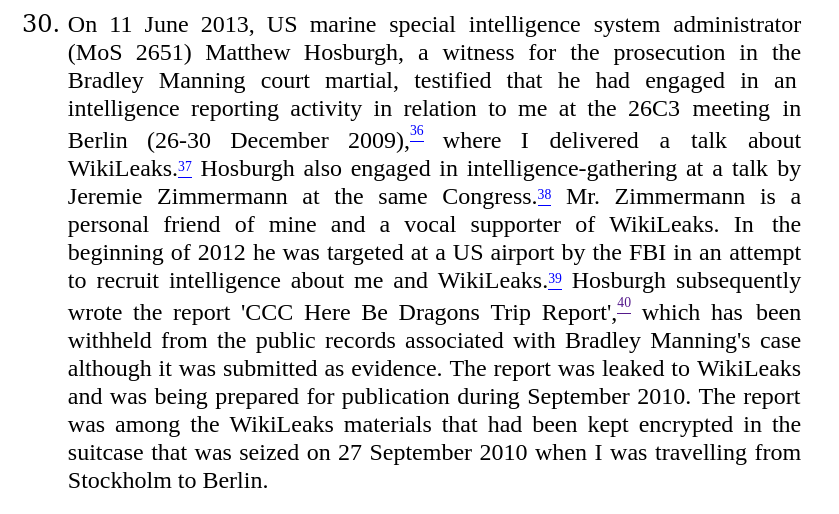
*
The author of this book can be found on Twitter: @Jaraparilla
*
Home - Genesis - 2007 - 2008 - 2009 - Early 2010 - Mid 2010 - Late 2010 - End 2010 - Early 2011 - Mid 2011 - Late 2011 - End 2011 - Early 2012 - Late 2012 - Early 2013- Late 2013 - 2014 - 2015 - Early 2016 - Late 2016 - 2017-19
Copyright Gary Lord 2021, 2022, 2023